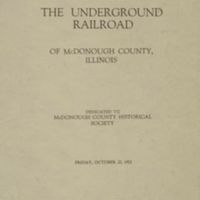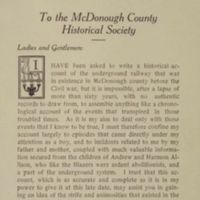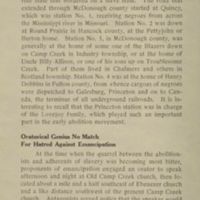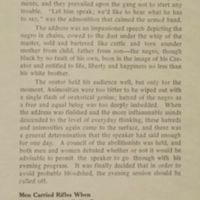Testimony of a conductor
Dublin Core
Title
Testimony of a conductor
Subject
The first pages of a transcript of a public lecture by David Blazer to the McDonough County (Illinois) Historical Society, 1922
Description
David Blazer, of Aledo, Illinois, shared his memory and specific details of the underground railroad activities of his father, uncle, grandfather, and of another family, the Allisons, in McDonough County, Illinois before the Civil War.
Creator
David Blazer
Source
History of the underground railroad of McDonough County, Illinois
Publisher
Aledo, Il.:Times Record Company
Date
1922
Contributor
Library of Congress
Rights
public domain
Format
jpeg image
Language
English
Type
text
Identifier
WIUGRR #11
Coverage
Illinois, United States
Text Item Type Metadata
Text
To the McDonough County Historical Society
Ladies and Gentlemen:
I HAVE been asked to write a historical account of the underground railway that was in existence in McDonough county before the Civil war, but it is impossible, after a lapse of more than sixty years, with no authentic records to draw from, to assemble anything like a chronological account of the events that transpired in those troubled times. As it is my aim to deal only with those events that I know to be true, I must therefore confine my account largely to episodes that came directly under my attention as a boy, and to incidents related to me by my father and mother, coupled with much valuable information secured from the children of Andrew and Harmon Allison, who like the Blazers were ardent abolitionists, and a part of the underground system. I trust that this account, which is as accurate and complete as it is in my power to give it at this late date, may assist you in gaining an idea of the strife and animosities that existed in the decade ending in 1860. It was preached that slavery was a divine institution and that the negro was nothing more than an animal; the fearless men who operated the underground system were criminals in the eyes of the law but they gained courage for their dangerous work in the firm belief that they were performing a duty in the eyes of God and that the black man was a human being with a soul. All underground railroads started on the line of some free state that bordered on a slave state. The road that extended through McDonough county started at Quincy, which was station No. 1, receiving negroes from across the Mississippi river in Missouri. Station No. 2 was down at Round Prairie in Hancock county, at the Pettyjohn or Burton home. Station No. 3, in McDonough county, was generally at the home of some one of the Blazers down on Camp Creek in Industry township, or at the home of Uncle Billy Allison, or one of his sons up on Troublesome Creek. Part of them lived in Chalmers and others in Scotland township. Station No. 4 was at the home of Henry Dobbins in Fulton county, from whence cargoes of negroes were dispatched to Galesburg, Princeton and on to Canada, the terminus of all underground railroads. It is interesting to recall that the Princeton station was in charge of the Lovejoy family, which played such an important part in the early abolition movement.
Oratorical Genius No Match For Hatred Against Emancipation
At the time when the quarrel between the abolitionists and adherents of slavery was becoming most bitter, proponents of emancipation engaged an orator to speak afternoon and night at Old Camp Creek church, then located about a mile and a half southeast of Ebenezer church and a like distance southwest of the present Camp Creek church. Antagonists served notice that the speaker would not be permitted to talk, and when the afternoon meeting hour drew near there was an organized gang present bent on breaking up the meeting and probably doing violence to the orator. These men were armed and acting in a threatening manner. The atmosphere was tense with excitement. Bloodshed was feared. There were men and women present, who, while not in sympathy with any argument that could be delivered against slavery, were governed by cooler judgments, and they prevailed upon the gang not to start any trouble. “Let him speak; we’d like to hear what he has to say,” was the admonition that calmed the armed band. The address was an impassioned speech depicting the negro in chains, cowed to the dust under the whip of the master, sold and bartered like cattle and torn asunder mother from child, father from son—the negro, though black by no fault of his own, born in the image of his Creator and entitled to life, liberty and happiness no less than his white brother.
The orator held his audience well, but only for the moment. Animosities were too bitter to be wiped out with a single flash of oratorical genius; hatred of the negro as a free and equal being was too deeply imbedded. When the address was finished and the more inflammable minds descended to the level of everyday thinking, these hatreds and animosities again came to the surface, and there was a general determination that the speaker had said enough for one day. A council of the abolitionists was held, and both men and women debated whether or not it would be advisable to permit the speaker to go through with his evening program. It was finally decided that in order to avoid probable bloodshed, the evening session should be called off.
Men Carried Rifles When They Went to the Ballot Box
In 1852 the abolitionists had a candidate for president in John P. Hale. The adherents of slavery declared there should not be an abolitionist vote cast in McDonough county.
Ladies and Gentlemen:
I HAVE been asked to write a historical account of the underground railway that was in existence in McDonough county before the Civil war, but it is impossible, after a lapse of more than sixty years, with no authentic records to draw from, to assemble anything like a chronological account of the events that transpired in those troubled times. As it is my aim to deal only with those events that I know to be true, I must therefore confine my account largely to episodes that came directly under my attention as a boy, and to incidents related to me by my father and mother, coupled with much valuable information secured from the children of Andrew and Harmon Allison, who like the Blazers were ardent abolitionists, and a part of the underground system. I trust that this account, which is as accurate and complete as it is in my power to give it at this late date, may assist you in gaining an idea of the strife and animosities that existed in the decade ending in 1860. It was preached that slavery was a divine institution and that the negro was nothing more than an animal; the fearless men who operated the underground system were criminals in the eyes of the law but they gained courage for their dangerous work in the firm belief that they were performing a duty in the eyes of God and that the black man was a human being with a soul. All underground railroads started on the line of some free state that bordered on a slave state. The road that extended through McDonough county started at Quincy, which was station No. 1, receiving negroes from across the Mississippi river in Missouri. Station No. 2 was down at Round Prairie in Hancock county, at the Pettyjohn or Burton home. Station No. 3, in McDonough county, was generally at the home of some one of the Blazers down on Camp Creek in Industry township, or at the home of Uncle Billy Allison, or one of his sons up on Troublesome Creek. Part of them lived in Chalmers and others in Scotland township. Station No. 4 was at the home of Henry Dobbins in Fulton county, from whence cargoes of negroes were dispatched to Galesburg, Princeton and on to Canada, the terminus of all underground railroads. It is interesting to recall that the Princeton station was in charge of the Lovejoy family, which played such an important part in the early abolition movement.
Oratorical Genius No Match For Hatred Against Emancipation
At the time when the quarrel between the abolitionists and adherents of slavery was becoming most bitter, proponents of emancipation engaged an orator to speak afternoon and night at Old Camp Creek church, then located about a mile and a half southeast of Ebenezer church and a like distance southwest of the present Camp Creek church. Antagonists served notice that the speaker would not be permitted to talk, and when the afternoon meeting hour drew near there was an organized gang present bent on breaking up the meeting and probably doing violence to the orator. These men were armed and acting in a threatening manner. The atmosphere was tense with excitement. Bloodshed was feared. There were men and women present, who, while not in sympathy with any argument that could be delivered against slavery, were governed by cooler judgments, and they prevailed upon the gang not to start any trouble. “Let him speak; we’d like to hear what he has to say,” was the admonition that calmed the armed band. The address was an impassioned speech depicting the negro in chains, cowed to the dust under the whip of the master, sold and bartered like cattle and torn asunder mother from child, father from son—the negro, though black by no fault of his own, born in the image of his Creator and entitled to life, liberty and happiness no less than his white brother.
The orator held his audience well, but only for the moment. Animosities were too bitter to be wiped out with a single flash of oratorical genius; hatred of the negro as a free and equal being was too deeply imbedded. When the address was finished and the more inflammable minds descended to the level of everyday thinking, these hatreds and animosities again came to the surface, and there was a general determination that the speaker had said enough for one day. A council of the abolitionists was held, and both men and women debated whether or not it would be advisable to permit the speaker to go through with his evening program. It was finally decided that in order to avoid probable bloodshed, the evening session should be called off.
Men Carried Rifles When They Went to the Ballot Box
In 1852 the abolitionists had a candidate for president in John P. Hale. The adherents of slavery declared there should not be an abolitionist vote cast in McDonough county.
Original Format
book
Files
Citation
David Blazer, “Testimony of a conductor,” Traces of Western Illinois' Underground Railroad, accessed May 20, 2024, https://timroberts.org/wiugrr/items/show/11.



